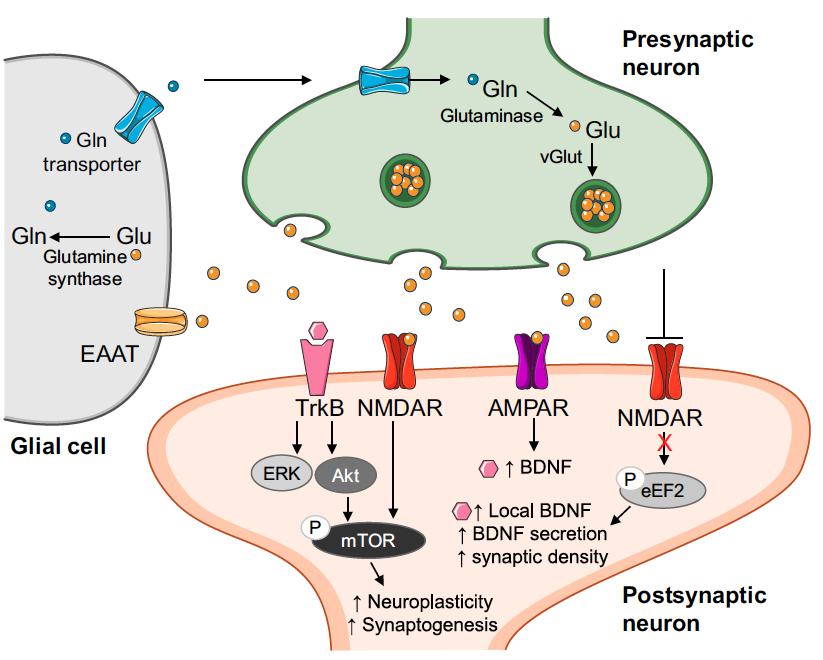Glutamate’s Role in Depression
Given the recent debunking of the serotonin theory of depression, Dr. Weiner explores glutamate’s role in depression and neuroplasticity, exploring how glutamate's complex signaling mechanisms contribute to mood regulation and mental health, offering new perspectives for effective treatments.
Recent research has debunked the “serotonin theory” of depression, which suggested that low serotonin levels, or imbalances of serotonin, were primarily responsible for negatively influencing mood, emotions, and overall mental health. This model has traditionally guided treatments focusing on enhancing serotonin activity to alleviate depressive symptoms (such as SSRIs and SNRIs). New research highlights the significance of glutamate a neurotransmitter in our system in understanding and addressing depression.
The Importance of Glutamate in Brain Function
Glutamate, the brain's most abundant neurotransmitter, is also the primary excitatory neurotransmitter. It plays a role in neural activation, synaptic transmission, and various brain functions, including learning and memory. Its functions extend to regulating synaptogenesis and neural plasticity for learning and adaptation to situations.
Figure: Glutamate signaling in neuroplasticity and synaptogenesis. Akt protein kinase B, AMPAR α-amino-3-hydroxy-5-methyl-4-isoxazolepropionic acid receptor, BDNF brain-derived neurotrophic factor, EAAT excitatory amino acid transporter, EF2 eukaryotic elongation factor 2, ERK extracellular signal-regulated kinases, Gln glutamine, Glu glutamate, mGluR metabotropic glutamate receptor, mTOR mammalian target of rapamycin, NMDAR N-methyl-daspartate receptor, P phosphorylated, TrkB tropomyosin receptor kinase B, vGLUT vesicular glutamate transporter. Modified from Lener et al. 2017 [162] and Henter et al. 2021 [14]. Figure illustration elements modified from Servier Medical Art (2022) by Servier (https:// smart. servi er. com, used under a Creative Commons Attribution 4.0 License)
Mechanisms of Glutamate Action
Glutamate functions through a complex network of receptors and transport systems.
Glutamate’s signaling involves traditional synaptic transmission where glutamate released from the presynaptic neuron excites the postsynaptic neuron. Additionally, glutamate is intricately managed within the brain by excitatory amino acid transporters on glial cells, which regulate its levels and prevent excitotoxicity, a condition arising from excessive activation of receptors by glutamate.
The primary receptors in glutamate signaling are ionotropic receptors (NMDA, AMPA, and kainate) and metabotropic receptors. Ionotropic receptors respond rapidly to glutamate, facilitating quick synaptic changes like those needed for fast cognitive adjustments. In contrast, metabotropic receptors modulate neural circuits over longer periods, influencing memory formation and neural plasticity.
Glutamate’s Role in Depression
In the context of depression, glutamate plays a complex and highly significant role.
Through research, we know that dysregulation of glutamate signaling has been linked to several core symptoms of depression, including impaired synaptic plasticity and reduced resilience to stress. The NMDA receptor, which has a high affinity for glutamate, is involved in synaptic modulation and memory formation – dysfunction in this receptor's activity is often observed in depressive states, pointing to glutamate's central role in mood disorders.
Research indicates that changes in the system can impact the structure and function of the brain, leading to mood swings and depressive symptoms. Excessive glutamate activity can overwhelm circuits, contributing to effects and cell damage commonly seen in cases of chronic stress and depression.
Clinical Significance of Understanding Glutamate’s Role
Understanding how glutamate influences depression has paved the way for new (and potentially more effective) treatment options by emphasizing the potential of adjusting this neurotransmitter to alleviate symptoms. NMDA receptor antagonists such as ketamine have shown to be effective in alleviating depression symptoms highlighting the significance of glutamate in regulating mood and synaptic plasticity.
Furthermore, treatments that target signaling are gaining prominence for their ability to quickly impact connections and brain function. This stands in contrast to antidepressants, which often require weeks to demonstrate efficacy signaling a potential shift in how we approach not just depression but other mental health conditions where glutamate imbalance plays a role.
The exploration of glutamate’s role in depression signifies an advancement in neuroscience and psychopharmacology. It provides insights into the roots of mood disorders and enhances our strategies for treating mental health issues. As research progresses, it becomes increasingly evident that glutamate is not merely a background player in brain chemistry, but also a key player influencing our emotions, reactions, and recovery from health challenges.

